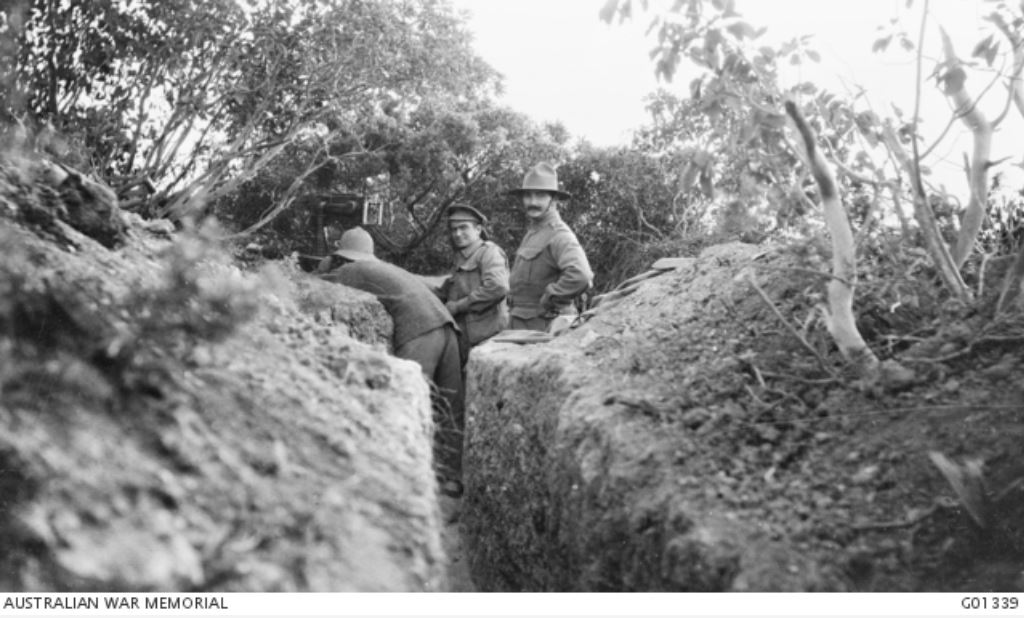10th Light Horse Regiment
From Our Contribution
 Shoulder patch | |
 10th LHR Machine Gun on Rhododendron Spur, Gallipoli. AWM photo G01339 | |
Contents
Brief History
On 10 October 1914, "C" Squadron of what had until then been known as 7th Light Horse Regiment was officially re-designated the 10th Light Horse Regiment. It was the only AIF light horse unit raised in Western Australia.
The regiment was sent to Egypt as part of the 3rd Light Horse Brigade, embarking from Fremantle on HMAT A47 Mashobra in two stages, beginning 7 February 1915, and arriving in Egypt on 8 March 1915.
The regiment's first action came during the Gallipoli campaign. Due to the terrain and the static nature of the fighting on the peninsula, it was felt that mounted units could not play a part; however, a number of light horse units were deployed in a dismounted role as infantry. The 10th Light Horse Regiment arrived at Gallipoli on 20 May 1915 and initially it was largely used in a defensive role. In August, however, the Allies attempted to break the stalemate, launching the August Offensive. The regiment's action at the Nek during this offensive was immortalised in the final scenes of the 1981 Peter Weir film Gallipoli. It was also involved in the Battle of Hill 60 later in August before being evacuated along with the rest of the Allied troops in December 1915.
Reverting to its original mounted infantry role, the regiment saw service in the Middle East for the remainder of the war, taking part in numerous actions including those at Romani and Beersheba. The regiment was later given the honour of leading the Australian Mounted Division, and accepted the formal surrender of the city of Damascus on 1 October 1918. During its service during the war, the regiment suffered 237 killed and 479 wounded.
Later, while awaiting repatriation, the regiment was used to suppress a nationalist uprising in Egypt in 1919.
Following its return to Australia, the 10th Light Horse Regiment was disbanded in 1919.
Regiment Personnel
- Phillip Selwyn Allen 1 Aug 1915 - 12 Oct 1917
- Ronald Adolphous Julian Batt 1 Jul 1915 - 1 Apr 1916
- Henry Thomas (Harry) Brear 22 May 1915 - 5 Mar 1916
- Edward Henson Broadhurst ?? - 27 Oct 1917 - WIA
- William Buck 13 Jul 1915 - 18 Jul 1916
- † Thomas Buckingham 23 Oct 1914 - 10 Aug 1915 - KIA
- Archibald Roland Bunney 26 Mar - 20 May 1917
- George Ezra Bunney 15 Aug 1916 - 17 Apr 1917
- Walter Cattach
- Frederick Charles Close
- Claude Francis Cooper 19 Aug 1914 - 30 Sep 1916
- Edward Augustus Davis
- Frank Orlando Dawson
- Robert Alexander Fernie
- Hobart Douglas Firns MID
- Denzel Roy (Roy) Fletcher
- Charles Franklyn Fuhrmann
- Charles Gorringe
- Spencer Gwynne DCM MID
- Selby Hartwell James
- Percy Francis Keenan
- Beverley John Liddelow
- William (George) Lyster
- Herbert Sherwood Marsh
- Francis Leonard Martin
- William Clarence Martin DCM & Bar
- William John Martin (1278)
- Hallidon (Ernest) McAliece
- Frederick Carnat David Mead
- Frederick Thorneycroft Plant
- Thomas Edward Raine
- John Regan
- Edward James (Ted) Rouse
- William Henry Shade
- Amos Roy (Roy) Smith
- Edward Harris (Ted) Smith
- Samuel Edward Tate
- Frank Erle Waters
- Gordon Percival White
Battle Honours
- South Africa
- Gallipoli
- Gaza-Beersheba
- Jerusalem
- Megiddo
- Damascus
Individual Honours
- 1 Victoria Cross (Hugo Throssell)
- 1 Companion of the Order of St Michael and St George
- 3 Distinguished Service Orders and one Bar
- 1 Member of the Order of the British Empire
- 9 Military Crosses and one Bar
- 15 Distinguished Conduct Medals and one Bar (William Clarence Martin DCM & Bar) & (Spencer Gwynne DCM MID)
- 15 Military Medals
- 3 Meritorious Service Medals
- 48 Mentions in Despatches, and (Hobart Douglas Firns MID) & (Spencer Gwynne DCM MID)
- 4 foreign awards.[1]
Notes
Content for the history and honours sections has come from a combination of Wikipedia and the Australian War Memorial websites.
- ↑ "10th Light Horse Regiment". Australian Army. Retrieved 21 April 2012.